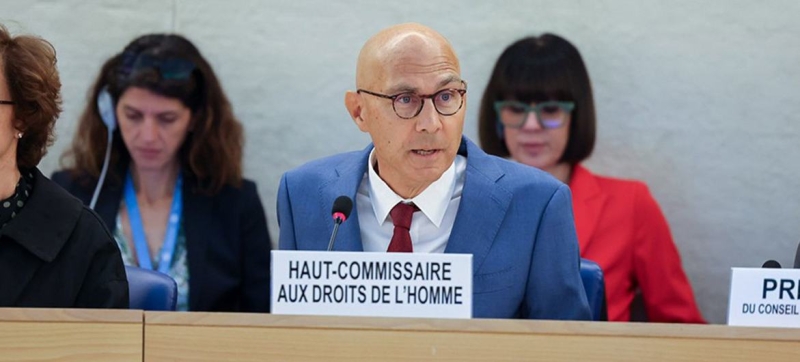
UN High Commissioner for Human Rights Volker Türk addresses the 57th session of the Human Rights Council. UN High Commissioner: Human Rights Are Our Column in the Fight Against Unrestricted Power Human Rights
The world is at a crossroads and must choose between a “dystopia” and a future in which human rights and justice prevail. This was emphasized by UN High Commissioner for Human Rights Volker Türk, speaking on the first day of the 57th session of the Human Rights Council.
He called for a rejection of the “new normal” that includes growing militarization, inequality and disinformation. Turk pointed to the detentions of journalists in Azerbaijan and several other countries, stressing that this is part of a wider trend of suppressing freedom of expression, assembly and the press, which are essential for a healthy society.
Civilians of Ukraine
Speaking about Ukraine, Turk stressed that civilians were caught in a “cycle of terror”. He noted, in particular, the large-scale power outages due to shelling by Russian forces.
Read also:
UN Mission: The number of civilian casualties in Ukraine has risen sharply
“I am worried about how the Ukrainians will survive the coming winter,” the High Commissioner said, noting the need for access to the affected areas to monitor the situation. He also criticized Russia’s refusal to provide such access to the country’s border areas and areas under its control.
Gaza War
Turk expressed deep concern over the ongoing war in Gaza. He condemned the violence in the October 7 attacks that killed more than 1,200 people in Israel. Since then, he said, more than 40,000 Palestinians have been killed by Israeli forces, many more have been injured and thousands more remain buried under rubble.
The High Commissioner warned that states “must not and cannot tolerate flagrant disregard for international law” and stressed the need to respect international norms and Security Council decisions in this and other conflicts.
Inequality and violence
Turk spoke of a global backsliding on gender equality, pointing to Afghanistan, where women are “effectively excluded from public life.” At the same time, women around the world face higher rates of poverty, gender-based violence and misogyny, the UN human rights chief noted.
He also expressed concern about the persistent problems of racism, xenophobia and related intolerance. Despite some progress, the global response remains “uneven and insufficient,” leading to deepening socio-economic inequalities, Türk stressed.
Hate speech
In addition, he said, some politicians and media continue to blame migrants, refugees and minorities for numerous problems, as was the case during elections in Austria, France, Germany, Hungary, the United Kingdom and the United States. “They take advantage of people’s anxiety and despair, pitting one group against another, and seek to distract citizens from their pressing problems and sow discord among them,” Türk warned. “History has shown us that hateful words can provoke hateful actions.” He stressed that only solutions based on human rights principles and facts can solve problems in areas such as health care, housing, employment and social protection.
The High Commissioner also warned against the misuse of digital technologies and the exploitation of personal data. He stressed the importance of regulating these technologies through a human rights-based approach and aimed at preventing violence, disinformation and hate speech, while ensuring that the benefits of technological progress are accessible to all, especially marginalized groups.
Death penalty
Speaking about the death penalty, Türk noted that global efforts to abolish it had been marred by a significant increase in the use of the death penalty in some States, such as the Islamic Republic of Iran and Saudi Arabia. As a result, the number of people executed worldwide had increased. “It will be important to address this issue and provide evidence and political arguments so that this trend can be reversed again,” the human rights activist stressed.
The Way Forward
Concluding his speech, Türk called for a stronger commitment to human rights as the foundation of peace, sustainable development and justice. He stressed that “human rights work is critical for peace” and that international institutions such as the UN Human Rights Office must be supported accordingly.
He called on countries to reject the “new normal” of indifference and embrace human rights as the path to a more just, peaceful and sustainable future.
